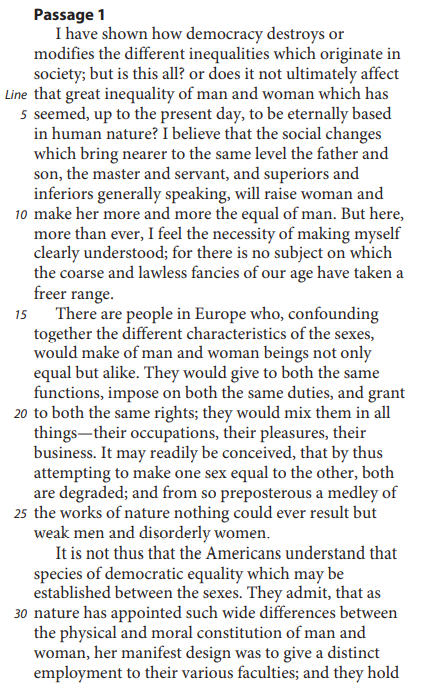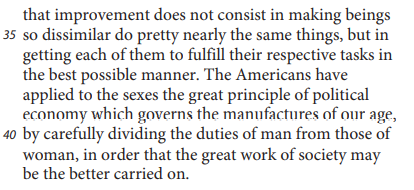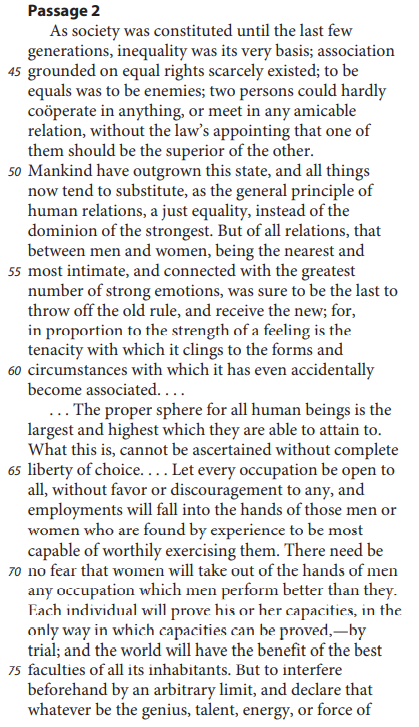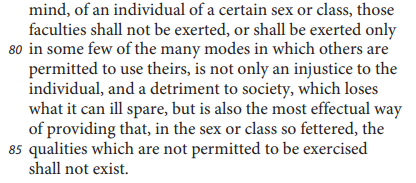SAT (Scholastic Assessment Test) is a standard test, used for taking admission to undergraduate programs of universities or colleges of the United States. SAT is developed and published by the College Board, an organization in the United States, administered by the Educational Testing Service. In this article of AKVTutorials, you will get SAT Reading Sample Questions Test 34 | SAT 2024 Online Tutor AMBiPi.
SAT Reading Practice Passage
Passage 1 is adapted from Alexis de Tocqueville, Democracy in America, Volume 2. Originally published in 1840. Passage 2 is adapted from Harriet Taylor Mill, “Enfranchisement of Women.” Originally published in 1851. As the United States and European societies grew increasingly democratic during the nineteenth century, debates arose about whether freedoms enjoyed by men should be extended to women as well.




SAT Reading Comprehension Practice Test Questions
SAT Practice Test 34 Question No 1
As used in line 9, “raise” most nearly means
Option A: increase.
Option B: cultivate.
Option C: nurture.
Option D: elevate.
SAT Practice Test 34 Answer No 1
Show/Hide Answer
Option D :
In the first paragraph of Passage 1, Tocqueville predicts that “the social changes which bring nearer to the same level the father and son, the master and servant, and superiors and inferiors generally speaking, will raise woman and make her more and more the equal of man.” In this context, to “raise” women to a higher social position most nearly means to elevate, or lift, them.
Choices A, B, and C are incorrect because in the context of Tocqueville’s prediction that women will attain a higher social position, the word “raise” most nearly means elevate, not increase (choice A), cultivate, or support (choice B), or nurture (choice C).
SAT Practice Test 34 Question No 2
In Passage 1, Tocqueville implies that treatment of men and women as identical in nature would have which consequence?
Option A: Neither sex would feel oppressed.
Option B: Both sexes would be greatly harmed.
Option C: Men would try to reclaim their lost authority.
Option D: Men and women would have privileges they do not need.
SAT Practice Test 34 Answer No 2
Show/Hide Answer
Option B :
In Passage 1, Tocqueville expresses concern that treating men and women as identical would likely harm both genders, rather than benefit them. This sentiment can be seen most clearly in the second paragraph, when he writes that “it may readily be conceived, that by thus attempting to make one sex equal to the other, both are degraded.”
Choice A is incorrect because Tocqueville says treating men and women as identical in nature would result in the degradation of both genders, a condition closer to oppression than to freedom from oppression. Choice C is incorrect because Tocqueville does not address the issue of whether men might ultimately try to reclaim any authority they lost as a result of the treatment of both genders as identical. Choice D is incorrect because in the passage, Tocqueville never claims that treating men and women the same would result in superfluous privileges for either.
SAT Practice Test 34 Question No 3
Which choice provides the best evidence for the answer to the previous question?
Option A: Lines 15-18 (“There… alike”)
Option B: Lines 18-20 (“They… rights”)
Option C: Lines 22-24 (“It may… degraded”)
Option D: Lines 27-29 (“It is… sexes”)
SAT Practice Test 34 Answer No 3
Show/Hide Answer
Option C :
The previous question asks what Tocqueville implies would result from treating men and women as identical in nature. The answer, that he believes such treatment would harm both men and women, is supported in the second paragraph of Passage 1: “It may readily be conceived, that by thus attempting to make one sex equal to the other, both are degraded.”
Choices A, B, and D are incorrect because the lines cited do not support the answer to the previous question about what Tocqueville implies would result from treating men and women as identical; instead, they discuss European approaches to such treatment, with no reference to the actual effects of it on men and women (choices A and B), and what Tocqueville considers Americans’ proper conception of equality as it relates to gender roles (choice D).
SAT Practice Test 34 Question No 4
As used in line 53, “dominion” most nearly means
Option A: omnipotence.
Option B: supremacy.
Option C: ownership.
Option D: territory.
SAT Practice Test 34 Answer No 4
Show/Hide Answer
Option B :
In the first paragraph of Passage 2, when discussing changing social relations, Mill writes that in her time there had come to exist “a just equality, instead of the dominion of the strongest.” In this context of a society where some had once wielded much greater power than others, the word “dominion” most nearly means supremacy, or greater power.
Choices A, C, and D are incorrect because in the context of a paragraph discussing differences in the amount of power possessed by members of a society, “dominion” means supremacy, or greater power, not omnipotence, or the state of being all-powerful (choice A), ownership (choice C), or territory (choice D).
SAT Practice Test 34 Question No 5
In Passage 2, Mill most strongly suggests that gender roles are resistant to change because they
Option A: have long served as the basis for the formal organization of society.
Option B: are matters of deeply entrenched tradition.
Option C: can be influenced by legislative reforms only indirectly.
Option D: benefit the groups and institutions currently in power.
SAT Practice Test 34 Answer No 5
Show/Hide Answer
Option B :
In the first paragraph of Passage 2, Mill suggests that social roles are resistant to change in part because of their being entrenched in the cultural tradition: “for, in proportion to the strength of a feeling is the tenacity with which it clings to the forms and circumstances with which it has even accidentally become associated.” In the context of a discussion of equality between men and women, Mill’s statement serves to imply that gender roles change so slowly precisely because they are so deeply ingrained in society and culture.
Choice A is incorrect because although Mill suggests in Passage 2 that gender roles are deeply entrenched, she does not imply that they serve as the foundation of society. Choice C is incorrect because Passage 2 does not address the issue of legislative reforms, only societal ones. Choice D is incorrect because although Mill addresses the difficulty of reforming traditional gender roles, she does not attribute it to the benefits that certain groups or institutions derive from those roles.
SAT Practice Test 34 Question No 6
Which choice provides the best evidence for the answer to the previous question?
Option A: Lines 43-44 (“As society… basis”)
Option B: Lines 46-49 (“two… other”)
Option C: Lines 58-61 (“in proportion… associated”)
Option D: Lines 67-69 (“employments… them”)
SAT Practice Test 34 Answer No 6
Show/Hide Answer
Option C :
The previous question asks about what Mill implies is the reason it is hard to change gender roles. The answer, that they are deeply entrenched in tradition, is supported in the first paragraph of Passage 2: “In proportion to the strength of a feeling is the tenacity with which it clings to the forms and circumstances with which it has even accidentally become associated.”
Choices A, B, and D are incorrect because the lines cited do not support the answer to the previous question about what Mill implies is the reason it is hard to change gender roles, instead describing the condition of general inequality in prior eras (choices A and B) and optimistically considering a future society that she imagines will be less unequal (choice D).
SAT Practice Test 34 Question No 7
Tocqueville in Passage 1 would most likely characterize the position taken by Mill in lines 65-69 in Passage 2 (“Let… them”) as
Option A: less radical about gender roles than it might initially seem.
Option B: persuasive in the abstract but difficult to implement in practice.
Option C: ill-advised but consistent with a view held by some other advocates ofgender equality.
Option D: compatible with economic progress in the United States but not in Europe.
SAT Practice Test 34 Answer No 7
Show/Hide Answer
Option C :
In the second paragraph of Passage 2, Mill writes that she believes job opportunities in her society should be open to all: “Let every occupation be open to all, without favor or discouragement to any, and employments will fall into the hands of those men or women who are found by experience to be most capable of worthily exercising them.” In the second paragraph of Passage 1, Tocqueville argues that equality between men and women would leave both degraded; nonetheless, he recognizes that the belief in such equality is widespread: “There are people in Europe who . . . would give to both the same functions, impose on both the same duties, and grant to both the same rights; they would mix them in all things — their occupations.” It can be inferred, then, that although Tocqueville would consider Mill’s position ill-advised, he does recognize this position as one that is held by a number of reformers.
Choice A is incorrect because Tocqueville in Passage 1 never characterizes advocacy on behalf of gender equality (such as Mill engages in, in Passage 2) as less radical than it initially seems. Choice B is incorrect because Mill’s stated belief that all jobs should be open to both men and women would clearly be refuted by Tocqueville as harmful to men and women alike. Choice D is incorrect because what Tocqueville praises the United States for is not gender equality as a component of economic progress, but rather the United States’ division of activity into masculine and feminine spheres, which he likens to the division of labor in industrial production.
SAT Practice Test 34 Question No 8
Both authors would most likely agree that the changes in gender roles that they describe would be
Option A: part of a broad social shift toward greater equality.
Option B: unlikely to provide benefits that outweigh their costs.
Option C: inevitable given the economic advantages of gender equality.
Option D: at odds with the principles of American democracy.
SAT Practice Test 34 Answer No 8
Show/Hide Answer
Option A :
Although the authors generally disagree about the roles men and women should occupy, both Tocqueville and Mill share the idea that gender equality is one small part of a societal shift toward equality in general. This can be seen in the first paragraph of Passage 1, where Tocqueville explains that raising woman to be “more and more the equal of man” is part of the overall “social changes which bring nearer to the same level the father and son, the master and servant,” and in the first paragraph of Passage 2, where Mill writes that “mankind have outgrown” the state of inequality and “now tend to substitute, as the general principle of human relations, a just equality,” with gender roles being the last of these relations to undergo such a shift.
Choice B is incorrect because although in Passage 1 Tocqueville argues that there are costs to treating men and women the same, in Passage 2 Mill characterizes gender equality as a source of benefits only. Choice C is incorrect because neither author considers changing gender roles in terms of economic ramifications, focusing instead on questions of fairness and justice and the fulfillment of people’s potential. Choice D is incorrect because Mill does not discuss the issue in terms of American democracy, though Tocqueville does.
SAT Practice Test 34 Question No 9
Which choice best describes the ways that the two authors conceive of the individual’s proper position in society?
Option A: Tocqueville believes that an individual’s position should be defined in important ways by that individual’s sex, while Mill believes that an individual’s abilities should be the determining factor.
Option B: Tocqueville believes that an individual’s economic class should determine that individual’s position, while Mill believes that class is not a legitimate consideration.
Option C: Tocqueville believes that an individual’s temperament should determine that individual’s position, while Mill believes that temperament should not be a factor in an individual’s position.
Option D: Tocqueville believes that an individual’s position should be determined by what is most beneficial to society, while Mill believes it should be determined by what an individual finds most rewarding.
SAT Practice Test 34 Answer No 9
Show/Hide Answer
Option A :
In Passage 1, Tocqueville argues that equality is generally beneficial for society, but he moderates that claim in the third paragraph by further stating that even if men and women should be considered equal, they should not work in the same jobs: “As nature has appointed such wide differences between the physical and moral constitution of man and woman, her manifest design was to give a distinct employment to their various faculties.” In contrast, Mill argues in the second paragraph of Passage 2 that men and women should be awarded work based on individual ability: “Let every occupation be open to all, without favor or discouragement to any, and employments will fall into the hands of those men or women who are found by experience to be most capable of worthily exercising them.” It can therefore be said that Tocqueville believes one’s gender should play a determining factor in one’s position in society, whereas Mill believes it should not.
Choice B is incorrect because both Tocqueville in Passage 1 and Mill in Passage 2 would likely argue against limiting an individual to the social class he or she was born to. Choice C is incorrect because it is Mill, not Tocqueville, who argues that individual temperament is the proper determining factor for social position. Choice D is incorrect because although it accurately represents Tocqueville’s implicit stance that an individual’s social position should contribute to society as a whole, it misrepresents Mill’s argument, which conceives of social position in relation to individual aptitude, not individual satisfaction.
SAT Practice Test 34 Question No 10
Based on Passage 2, Mill would most likely say that the application of the “great principle of political economy” (lines 38-39, Passage 1) to gender roles has which effect?
Option A: It prevents many men and women from developing to their full potential.
Option B: It makes it difficult for men and women to sympathize with each other.
Option C: It unintentionally furthers the cause of gender equality.
Option D: It guarantees that women take occupations that men are better suited to perform.
SAT Practice Test 34 Answer No 10
Show/Hide Answer
Option A :
In the third paragraph of Passage 1, Tocqueville credits the Americans of his time for applying “to the sexes the great principle of political economy . . . by carefully dividing the duties of man from those of woman.” In contrast, in the second paragraph of Passage 2, Mill argues that rigid social roles function to “declare that whatever be the genius, talent, energy, or force of mind, of an individual of a certain sex or class, those faculties shall not be exerted.” It can be inferred, then, that Mill would argue that the principle praised by Tocqueville tends to limit both men and women from developing their full potential.
Choice B is incorrect because in Passage 2, Mill focuses her argument on gender roles and equality between sexes but never addresses the idea of sympathy between them. Choice C is incorrect because Mill considers the division of professions by gender as a perpetuation of a long tradition of gender inequality. Choice D is incorrect because although Mill suggests that gender equality would involve rethinking the professional options available to men and women, she dismisses the notion that one gender is better suited to certain professions or would displace the other gender in certain professions.



